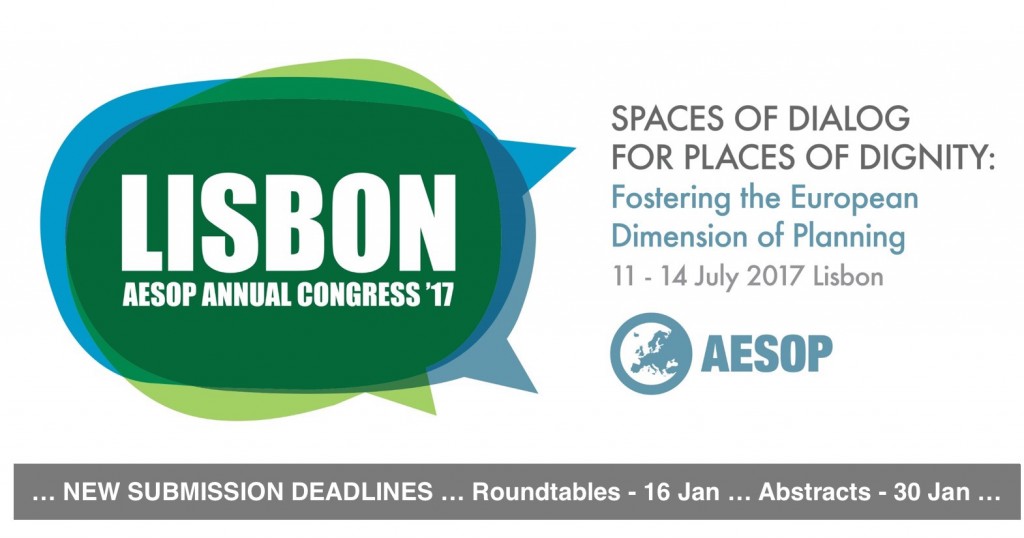
AESOP Annual Conference, Lisbon July 11-14 2017: Spaces of Dialog for Places of Dignity:Fostering the European Dimension of Planning
New Deadlines: Abstratcs – January 30th , Roundtables – January 16th
Track: Spaces of dialogue for active, networked and responsible citizenship
Chaired by:
Camilla Perrone, e-mail: camilla.perrone@unifi.it, Department of Architecture (DIDA), University of Florence, ITALY
Lia Vasconcelos, e-mail: ltv@fct.unl.pt, Department of Environmental Sciences and Engineering, Faculty of Sciences & Technology, NOVA University of Lisbon, PORTUGAL
Roberto Rocco, e-mail: r.c.rocco@tudelft.nl, Department of Urbanism, Chair of Spatial Planning and Strategy, Delft University of Technology; the Netherlands
Doreen Massey (2011) claimed space as the dimension of multiplicity: “If time is the dimension of sequence, then space is the space of contemporaneous existence. In that sense, it is the dimension of the social and therefore it is the dimension that poses the political question of how we are going to live together”. Massey calls this ‘radical simultaneity’, in which stories, ongoing trajectories and multiple voices happen simultaneously. Space is, therefore, composed by relations, practices and interactions imbued with power.
Descriptions of types of space in terms of levels of interactions are frequent in literature, ranging from self-organisation to deliberative/participatory experiments, as well as contested practices and multiple uses, offering generous inputs to planning theory and practice. What emerges is that spaces, places and people need to be reciprocally interconnected through networking and responsible citizenship.
Massey’s concept of space challenges the simultaneity of multiple trajectories displayed in a variety of intertwined existences. It feeds increasing uncertainty about what we mean by ‘places’ and how we relate to them. At the same time, it triggers a deeper and broader reflection on how to foster spaces of dialogue that can enable co-existences, diversity and social citizenship.
Accordingly, issues like the right to the city, power imbalances, empowerment practices, do-it-yourself urbanism, urban insurgency, social and environmental sustainability and the idea of common goods focus on a certain range of socio-spatial and political issues contributing to enter the debate, feeding democracy.
In radical simultaneity, where some voices are much more powerful and arresting than others, the pursuit of socio-spatial justice becomes urgent.
This track sheds light on a question that, among many others, seems highly relevant:
What to do in order to build democracy while we build our cities, in the quest for active citizenship and the right to this very city?
This track calls for contributions in answering this question and others arising from a world in political, economic and environmental turmoil.
What are roles, tools and procedures that will allow us “to live together” in a world of finite resources, in contexts of complexity and uncertainty?
What factors will allow weak and disadvantaged voices to be heard and will furthermore allow them to interfere and participate in the production of urban space?
How can we include multiple voices and create spaces of dialogue for active, networked and responsible citizenship?
How can we make society more inclusive and encompass diversity?
How can spaces of dialogue generate social transformation?
In addition, we welcome contributions that discuss the role of socio-spatial planners and the tools they use to mediate and steer competing and often contradictory claims over spaces and resources. This will allow us to grasp the double side of the question that concerns ways of living and the ways of acting in society, and to explore the implications for planning theory and practice in a European dimension.
300-word abstracts must be submitted in English. Abstracts must contain a clear description of a relevant issue, a research question and a short explanation of how this question was answered (the methodology), as well as a summary of the findings.
